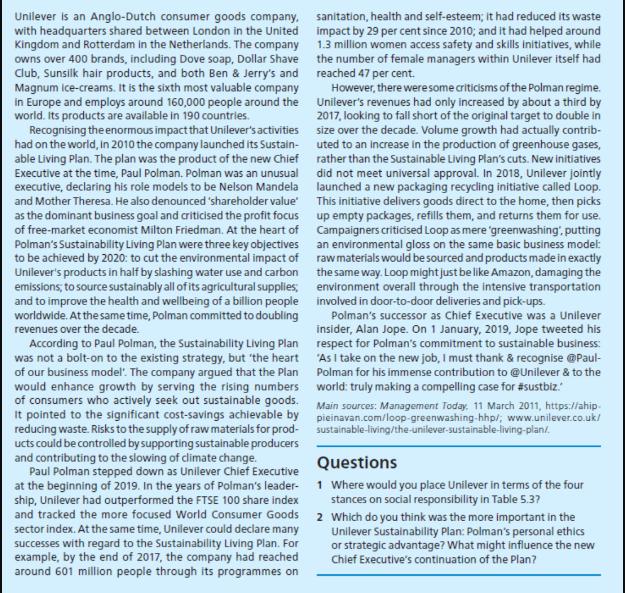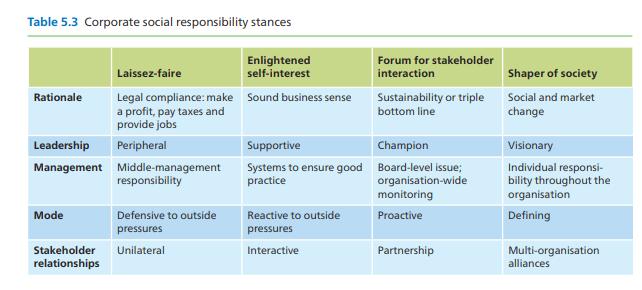Answered step by step
Verified Expert Solution
Question
1 Approved Answer
Unilever is an Anglo-Dutch consumer goods company, with headquarters shared between London in the United Kingdom and Rotterdam in the Netherlands. The company owns


Unilever is an Anglo-Dutch consumer goods company, with headquarters shared between London in the United Kingdom and Rotterdam in the Netherlands. The company owns over 400 brands, including Dove soap, Dollar Shave Club, Sunsilk hair products, and both Ben & Jerry's and Magnum Ice-creams. It is the sixth most valuable company in Europe and employs around 160,000 people around the world. Its products are available in 190 countries. Recognising the enormous impact that Unilever's activities had on the world, in 2010 the company launched its Sustain- able Living Plan. The plan was the product of the new Chief Executive at the time, Paul Polman. Polman was an unusual executive, declaring his role models to be Nelson Mandela and Mother Theresa. He also denounced 'shareholder value' as the dominant business goal and criticised the profit focus of free-market economist Milton Friedman. At the heart of Polman's Sustainability Living Plan were three key objectives to be achieved by 2020: to cut the environmental impact of Unilever's products in half by slashing water use and carbon emissions; to source sustainably all of its agricultural supplies; and to improve the health and wellbeing of a billion people worldwide. At the same time, Polman committed to doubling revenues over the decade. According to Paul Polman, the Sustainability Living Plan was not a bolt-on to the existing strategy, but 'the heart of our business model'. The company argued that the Plan would enhance growth by serving the rising numbers of consumers who actively seek out sustainable goods. It pointed to the significant cost-savings achievable by reducing waste. Risks to the supply of raw materials for prod- ucts could be controlled by supporting sustainable producers and contributing to the slowing of climate change. Paul Polman stepped down as Unilever Chief Executive at the beginning of 2019. In the years of Polman's leader- ship, Unilever had outperformed the FTSE 100 share index and tracked the more focused World Consumer Goods sector index. At the same time, Unilever could declare many successes with regard to the Sustainability Living Plan. For example, by the end of 2017, the company had reached around 601 million people through its programmes on sanitation, health and self-esteem; it had reduced its waste impact by 29 per cent since 2010; and it had helped around 1.3 million women access safety and skills initiatives, while the number of female managers within Unilever itself had reached 47 per cent. However, there were some criticisms of the Polman regime. Unilever's revenues had only increased by about a third by 2017, looking to fall short of the original target to double in size over the decade. Volume growth had actually contrib- uted to an increase in the production of greenhouse gases, rather than the Sustainable Living Plan's cuts. New initiatives did not meet universal approval. In 2018, Unilever jointly launched a new packaging recycling initiative called Loop. This initiative delivers goods direct to the home, then picks up empty packages, refills them, and returns them for use. Campaigners criticised Loop as mere 'greenwashing, putting an environmental gloss on the same basic business model: raw materials would be sourced and products made in exactly the same way. Loop might just be like Amazon, damaging the environment overall through the intensive transportation involved in door-to-door deliveries and pick-ups. Polman's successor as Chief Executive was a Unilever insider, Alan Jope. On 1 January, 2019, Jope tweeted his respect for Polman's commitment to sustainable business: 'As I take on the new job, I must thank & recognise @Paul- Polman for his immense contribution to @Unilever & to the world: truly making a compelling case for #sustbiz. Main sources: Management Today, 11 March 2011, https://ahip pieinavan.com/loop-greenwashing-hhp/; www.unilever.co.uk/ sustainable-living/the-unilever-sustainable-living-plan/. Questions 1 Where would you place Unilever in terms of the four stances on social responsibility in Table 5.3? 2 Which do you think was the more important in the Unilever Sustainability Plan: Polman's personal ethics or strategic advantage? What might influence the new Chief Executive's continuation of the Plan? Table 5.3 Corporate social responsibility stances Laissez-faire Enlightened self-interest Forum for stakeholder interaction Shaper of society Rationale Legal compliance: make Sound business sense a profit, pay taxes and Sustainability or triple Social and market provide jobs Leadership Peripheral Management Middle-management responsibility Supportive bottom line Champion Systems to ensure good Board-level issue; practice organisation-wide monitoring change Visionary Individual responsi- bility throughout the organisation Mode Defensive to outside pressures Reactive to outside Proactive pressures Stakeholder Unilateral Interactive relationships Partnership Defining Multi-organisation alliances
Step by Step Solution
There are 3 Steps involved in it
Step: 1

Get Instant Access to Expert-Tailored Solutions
See step-by-step solutions with expert insights and AI powered tools for academic success
Step: 2

Step: 3

Ace Your Homework with AI
Get the answers you need in no time with our AI-driven, step-by-step assistance
Get Started


